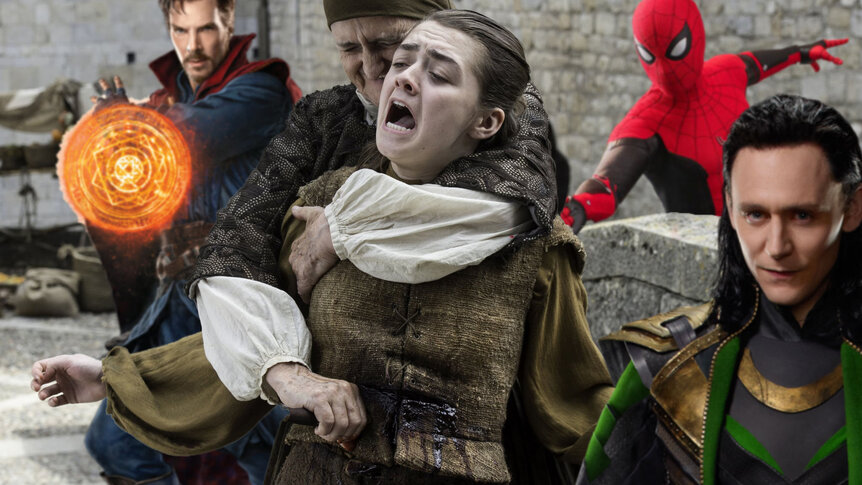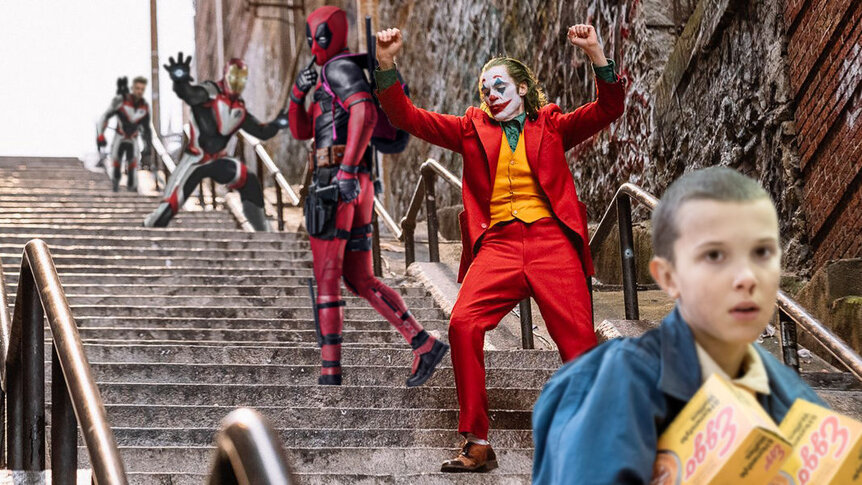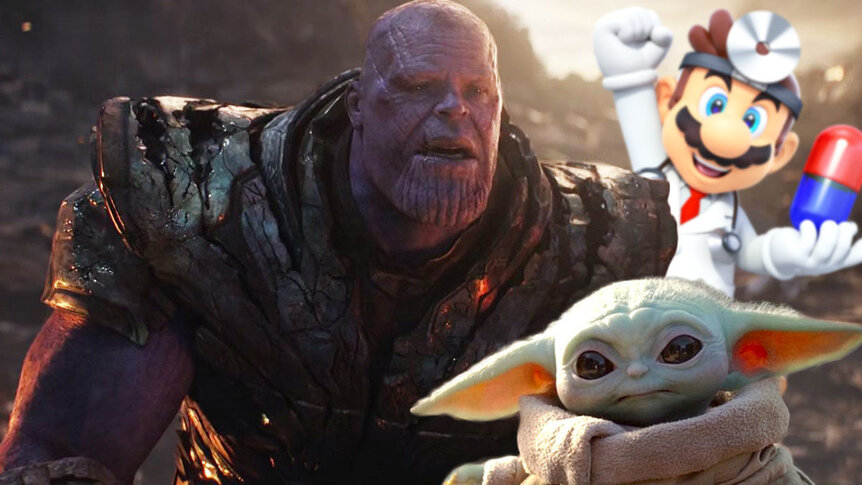Create a free profile to get unlimited access to exclusive videos, sweepstakes, and more!
The 6 types of fan theories, and why they matter

For more than a year, I’ve been writing a weekly column for SYFY WIRE where I round up some of the biggest or craziest fan theories that have been circulating around the web. Some of the theories have been good, but most of them have been bad, and the way the media covers them is even worse. And after dozens and dozens of articles trying to evaluate or debunk all of them, I have a question: What is a fan theory? And, more importantly, why?
It seems like these should be easy questions to answer. Fan theories are ideas and speculation that audiences have about movies, shows, comics, or anything, really. They exist because fans are creative and passionate about the things they love, and they’re written about by entertainment news sites because people like to read about them.
That’s an oversimplification, though, and it overlooks what the obsession with fan theories is doing to the way people interact with fiction. When everyone is a would-be theorist, they’re engaging with pop culture in a different sort of way than before. With the season premiere of Westworld — which is practically made for people to theorize over — around the corner, it seems like a good time to take a real look at what fan theories are and what they do.
THE TYPES OF FAN THEORIES
There are several different types of fan theories — and these categories are much more distinct than “good” theories and “bad” theories, although that dichotomy certainly exists. It’s not so much about how strong the evidence is or isn’t for a theory, or how improbable the hypothesis is. Different types of fan theories have different goals.
Mystery-Solving Theories
Some fan theories are attempting to solve a mystery that actually exists within the work of fiction. The best example of a theory like this is “R + L = J,” the longstanding Song of Ice and Fire theory about Jon Snow’s true parentage that Game of Thrones eventually confirmed. Westworld sparks a ton of these theories, and even though many of the theories were maddeningly, utterly wrong, you can see they were going for something. The question of Rey’s parentage in the new Star Wars movies also prompted this type of theory.
Predictive Theories
Technically, “What happens next?” is a question, but this sort of fan theory is different from the true mystery-solving fan theories. There’s potential for some interesting, accurate theorizing in this category — these theories often home in on common storytelling techniques such as foreshadowing. Perhaps the theorist noticed a detail in Episode 3 that they have good reason to believe will come back in a big way in Episode 10.
But far too often you’ll see fan theorists stretching the limits of what could actually be called a “theory,” which results instead in them writing fanfiction. For instance, there are lots of fan theories about the plot of upcoming Marvel Cinematic Universe films like Thor: Love and Thunder and Doctor Strange in the Multiverse of Madness despite the fact that there are almost no concrete details about what to expect from those films. In this instance, the fan theory isn’t a theory anymore — it’s just baseless speculation.
Plot-Hole-Filling Theories
A small but pernicious genre, these fan theories are attempting to answer questions, just not ones that matter. Movies and TV shows are hard to make, and continuity errors happen. Simple real-world mistakes don’t require elaborate, in-fiction theories explaining them away. Sometimes this need to explain every last thing can get really absurd.
For instance, some fans thought it was a “plot hole” that Arya Stark didn’t die when the Waif stabbed her in Season 6. An elaborate theory attempted to explain this by positing that she actually did die and the “Arya” we saw after that was actually the Waif — never mind that this opened up way more actual plot holes. Essentially, this sort of theory bends over backward to explain small mistakes or shoddy writing, and you can’t often fix bad with more bad.
Retcon Theories
These theories have a lot in common with some of the more extreme plot-hole-filling theories, and indeed you can find shades of this genre in some of the worst examples of any sort of theory. Retcon theories argue that what you saw happen on screen didn’t actually happen. For instance, there’s a theory that, despite what we all saw happen at the end of The Rise of Skywalker, Palpatine won, actually. Another argues that Black Widow didn’t actually die in Endgame, somebody else did.
These theories almost never make sense — the amount of evidence you’d need to disprove visual canon is immense — and more importantly, they start playing Calvinball with the very idea of a work of fiction. Anyone can make a theory that anything happened, and in that light, what’s the point?
Head-Canon Theories
This genre of fan theory is mostly harmless but often annoying. These are the theories that are fun — like the idea that Elsa and Anna’s parents from Frozen are also Tarzan’s parents. These theories are often impossible to prove and frequently easy to disprove, but that’s not really the point. They’re just a fun way for fans to creatively engage with their fandoms.
They become annoying, though, when there are dozens and dozens of articles about them. This gives these initially harmless little theories more gravity than they ever really should have aspired to, and suddenly you have people reading about Tarzan and Frozen as if it could ever be canon that they’re connected. (It’s worth noting that the theory that Peter Parker made a cameo in Iron Man 2 was initially just head-canon, but Marvel retroactively made it canon. That’s kind of neat, but it has also, I’m sure, given tons of unwitting fuel to people who think that their theories, their head-canons, can become official).
Really Bad, Real-World Fan Theories
Finally, we have theories that are about the real world, like speculation about how Disney and Sony will handle licensing disputes.
These are the most irresponsible types of theories, as unlike fiction, things in the real world are actually, you know, real. You can write whatever you want about what you think Thor might do in the next MCU movie because he doesn’t exist. Especially for entertainment journalists who cover fan theories, aggregating these theories is exceptionally bad because you could — and should — be reporting on what’s going on in the real world, not speculating as if it’s all just entertainment.
WHY DO WE COVER FAN THEORIES?I’ve written at length about the interesting space fan theory coverage occupies from a journalist’s perspective. I won’t get fully into it here, though I encourage you to check out the Columbia Journalism Review story if you’re interested in knowing what journalists owe you, the reader, when it comes to fan theories.
Still, without going too deep behind the scenes, it’s important to understand that most fan theories originate on Reddit or some other social media. That seems like a good place for them, although the fervor with which some theorists toss out wild ideas with the end goal of getting upvotes rather than actually achieving any sort of great understanding of whatever show or movie they’re talking about is a little distressing. It’s when entertainment news websites — which are supposed to have some sort of quality standards — start aggregating even the most specious theories that we have a problem.
Often, these aggregations will eventually note that a particularly bad theory is implausible, but because of the way websites bring in traffic, these stories are almost always framed in an enthusiastic way. It’s harder to get somebody to click on a headline that says “This theory is wrong” than it is to promise some wild stuff and imply that it could be true — just click the link to find out. Clickbait has become such a malleable phrase that it’s almost meaningless, but for some of the bottom-of-the-barrel fan theories that make the rounds, it feels appropriate.
(For my part, I do feel complicit, in a sense, but The Week in Fan Theories/Fan Theory Madness has always been more about criticism than it has been about just rehashing shoddy theories.)
WHY DOES ANY OF THIS MATTER?It doesn’t. That’s the frustrating thing about fan theories. With the exception of those theories that attempt to spin a fiction about the real world, fan theories are all just make-believe. That can, of course, be a fun, positive addition to fandoms, as it’s an exciting way to really get into the weeds of a show or movie. Theories aren’t hurting anyone, and there should absolutely be a lower bar for entertainment journalists who write about fan theories, as it’s much more acceptable to speculate about superheroes than it is to speculate about real news.
And yet there is something troubling about the fan theory industrial complex. Fan theories are subtly changing the way that a generation of fans engages with pop culture. Not everything in fiction is a puzzle box or a mystery waiting to be solved. There’s room in fiction for mistakes and intentional ambiguity. The end goal of entertainment shouldn’t be winning, but the impulse to search for answers and spin fan theories make certain parts of pop culture feel more participatory than they actually are.
It’s hardly the most serious problem in a world full of problems, but just know that for all the insights and new understandings a good fan theory can unlock, focusing on the speculative too much can blind you to what you’re actually seeing.
The views and opinions expressed in this article are the author's, and do not necessarily reflect those of SYFY WIRE, SYFY, or NBC Universal.





























